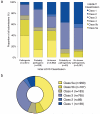Application of a 5-tiered scheme for standardized classification of 2,360 unique mismatch repair gene variants in the InSiGHT locus-specific database
- PMID: 24362816
- PMCID: PMC4294709
- DOI: 10.1038/ng.2854
Application of a 5-tiered scheme for standardized classification of 2,360 unique mismatch repair gene variants in the InSiGHT locus-specific database
Abstract
The clinical classification of hereditary sequence variants identified in disease-related genes directly affects clinical management of patients and their relatives. The International Society for Gastrointestinal Hereditary Tumours (InSiGHT) undertook a collaborative effort to develop, test and apply a standardized classification scheme to constitutional variants in the Lynch syndrome-associated genes MLH1, MSH2, MSH6 and PMS2. Unpublished data submission was encouraged to assist in variant classification and was recognized through microattribution. The scheme was refined by multidisciplinary expert committee review of the clinical and functional data available for variants, applied to 2,360 sequence alterations, and disseminated online. Assessment using validated criteria altered classifications for 66% of 12,006 database entries. Clinical recommendations based on transparent evaluation are now possible for 1,370 variants that were not obviously protein truncating from nomenclature. This large-scale endeavor will facilitate the consistent management of families suspected to have Lynch syndrome and demonstrates the value of multidisciplinary collaboration in the curation and classification of variants in public locus-specific databases.
Figures





References
-
- Buerki N, et al. Evidence for breast cancer as an integral part of lynch syndrome. Genes Chromosomes Cancer. 2012;51:83–91. - PubMed
Publication types
MeSH terms
Grants and funding
- 1R01CA164944/CA/NCI NIH HHS/United States
- R01 CA115783/CA/NCI NIH HHS/United States
- 12-1087/AICR_/Worldwide Cancer Research/United Kingdom
- U24 CA074794/CA/NCI NIH HHS/United States
- P50 CA116201/CA/NCI NIH HHS/United States
- P50CA11620106/CA/NCI NIH HHS/United States
- U01 CA097735/CA/NCI NIH HHS/United States
- UM1 CA167551/CA/NCI NIH HHS/United States
- R01 CA164944/CA/NCI NIH HHS/United States
- U24 CA074799/CA/NCI NIH HHS/United States
- U24 CA074800/CA/NCI NIH HHS/United States
- U01 CA074800/CA/NCI NIH HHS/United States
- U01 CA074799/CA/NCI NIH HHS/United States
- MC_PC_U127527198/MRC_/Medical Research Council/United Kingdom
- U24 CA074783/CA/NCI NIH HHS/United States
- 12076/CRUK_/Cancer Research UK/United Kingdom
- MC_U127527198/MRC_/Medical Research Council/United Kingdom
- U24 CA097735/CA/NCI NIH HHS/United States
- U01 CA074794/CA/NCI NIH HHS/United States
- 090532/WT_/Wellcome Trust/United Kingdom
- MR/K018647/1/MRC_/Medical Research Council/United Kingdom
- U01 CA074783/CA/NCI NIH HHS/United States
- R01 CA115783-02/CA/NCI NIH HHS/United States
LinkOut - more resources
Full Text Sources
Other Literature Sources
Miscellaneous

